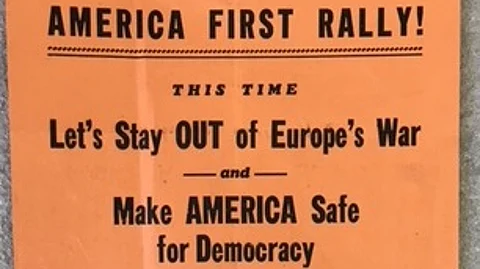

U.S. President Donald Trump has responded to criticism from within his own support base over what some perceive as a shift away from his signature “America First” foreign policy—particularly in relation to rising tensions with Iran.
In an interview published Saturday by The Atlantic, Trump addressed concerns raised by key allies, including journalist Tucker Carlson, a prominent voice who has long opposed American military involvement in the Middle East. Carlson has warned that a potential war with Iran runs counter to the “America First” doctrine.
“Well, considering that I’m the one that developed ‘America First,’ and considering that the term wasn’t used until I came along, I think I’m the one that decides that,” Trump said.
Despite Trump’s assertion, the phrase “America First” has historical roots dating back to the 1930s. It gained prominence in 1940 through the America First Committee, which advocated against U.S. involvement in World War II and promoted a non-interventionist approach—a central pillar of today’s populist right.
Addressing the question of peace, Trump added, “For those people who say they want peace—you can’t have peace if Iran has a nuclear weapon. So for all of those wonderful people who don’t want to do anything about Iran having a nuclear weapon—that’s not peace.”
Another influential figure who has voiced concern over a potential conflict with Iran is Steve Bannon, former White House strategist and longtime Trump ally. Speaking to the Financial Times on Saturday, Bannon warned against U.S. involvement in another Middle Eastern war. He also emphasized the divergence of American and Israeli interests in such conflicts, stating, “The U.S. needs to be more ‘America First’ just as the Israelis will always be ‘Israel First.’”
The president’s remarks—and the pushback from high-profile supporters—highlight a persistent debate within the Republican Party since the emergence of populist conservatism in 2016. At its core is a question of what truly serves America’s national interest: continued global engagement or a renewed focus on domestic priorities and military retrenchment.